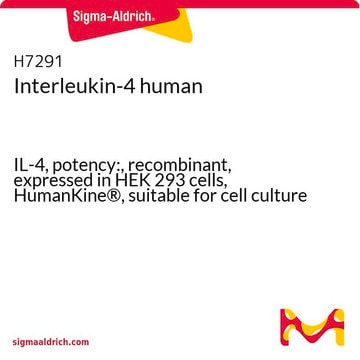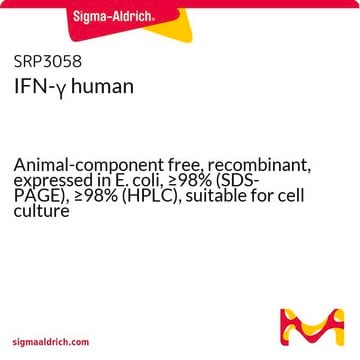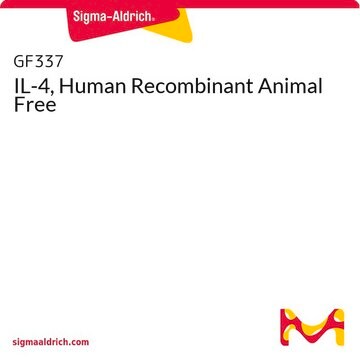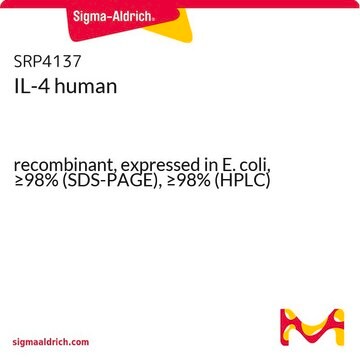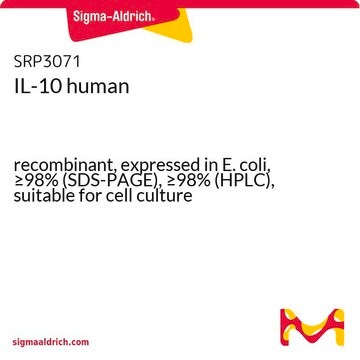SRP3274
IL-13 human
Animal-component free, recombinant, expressed in E. coli, ≥98% (SDS-PAGE), ≥98% (HPLC)
Synonym(s):
NC300
Sign Into View Organizational & Contract Pricing
All Photos(1)
About This Item
UNSPSC Code:
12352202
NACRES:
NA.32
Recommended Products
biological source
human
recombinant
expressed in E. coli
Assay
≥98% (HPLC)
≥98% (SDS-PAGE)
form
lyophilized
potency
≥1.0 ng/mL
mol wt
12.6 kDa
packaging
pkg of 10 μg
impurities
<0.1 EU/μg endotoxin, tested
color
white to off-white
UniProt accession no.
shipped in
wet ice
storage temp.
−20°C
Gene Information
human ... IL13(3596)
General description
Interleukin-13 (IL-13) is an immunoregulatory cytokine produced primarily by activated T-helper 2 (Th2) cells,and also by mast cells and natural killer (NK) cells. The gene encoding it is localized on human chromosome 5q31. Human and murine IL-13 is cross-species reactive. Recombinant human IL-13 is a 12.6kDa protein consisting of 115 amino acid residues.
Biochem/physiol Actions
Interleukin-13 (IL-13) has a role in immune activities against infections and influences the function of various cells taking part in the same. It has been studied to be overexpressed in glioblastoma tumors and cell lines. IL-13 stimulates fibrosis in many infectious diseases. Targeted deletion of IL-13 in mice resulted in impaired T-helper 2 (Th2) cell development and indicated an important role for IL-13 in the expulsion of gastrointestinal parasites. IL-13 exerts anti-inflammatory effects on monocytes and macrophages and it inhibits the expression of inflammatory cytokines such as tumor necrosis factor-α (TNF-α), interleukins-1β, -6 and -8. IL-13 has also been shown to enhance B cell proliferation and to induce isotype switching resulting in increased production of immunoglobulin E (IgE). Blocking of IL-13 activity inhibits the pathophysiology of asthma.
Physical form
Lyophilized from 20mM Sodium Phosphate, pH 7.0.
Reconstitution
Centrifuge the vial prior to opening. Reconstitute in water to a concentration of 0.1-1.0 mg/mL. Note: Slow to dissolve. Do not vortex. This solution can be stored at 2-8°C for up to 1 week. For extended storage, it is recommended to further dilute in a buffer containing a carrier protein (example 0.1% BSA) and store in working aliquots at -20°C to -80°C.
Storage Class Code
10 - Combustible liquids
WGK
WGK 3
Flash Point(F)
Not applicable
Flash Point(C)
Not applicable
Certificates of Analysis (COA)
Search for Certificates of Analysis (COA) by entering the products Lot/Batch Number. Lot and Batch Numbers can be found on a product’s label following the words ‘Lot’ or ‘Batch’.
Already Own This Product?
Find documentation for the products that you have recently purchased in the Document Library.
Customers Also Viewed
Ji-Yun Lee et al.
Journal of immunology (Baltimore, Md. : 1950), 194(12), 5990-5998 (2015-05-15)
Mucin overproduction is a hallmark of otitis media (OM). Streptococcus pneumoniae is one of the most common bacterial pathogens causing OM. Mucin MUC5AC plays an important role in mucociliary clearance of bacterial pathogens. However, if uncontrolled, excessive mucus contributes significantly
Genetic variants of IL-13 signalling and human asthma and atopy.
Heinzmann A
Human Molecular Genetics, 9(4), 549-559 (2000)
Gui Yang et al.
The Journal of biological chemistry, 290(20), 12858-12867 (2015-04-04)
Restoration of the antigen (Ag)-specific immune tolerance in an allergic environment is refractory. B cells are involved in immune regulation. Whether B cells facilitate the generation of Ag-specific immune tolerance in an allergic environment requires further investigation. This paper aims
IL-4, IL-10 and IL-13 down-regulate monocyte-chemoattracting protein-1 (MCP-1) production in activated intestinal epithelial cells.
Kucharzik T
Clinical and Experimental Immunology, 111(1), 152-157 (1998)
Lu Liu et al.
Journal of experimental & clinical cancer research : CR, 41(1), 358-358 (2022-12-25)
IFN-γ is a key mediator of tumor immunity that can induce macrophage polarization to suppress tumor growth. Cyclin G2 functions as a tumor suppressor in various cancer cells; however, its role in macrophages remains unclear. This study aimed to investigate
Our team of scientists has experience in all areas of research including Life Science, Material Science, Chemical Synthesis, Chromatography, Analytical and many others.
Contact Technical Service




